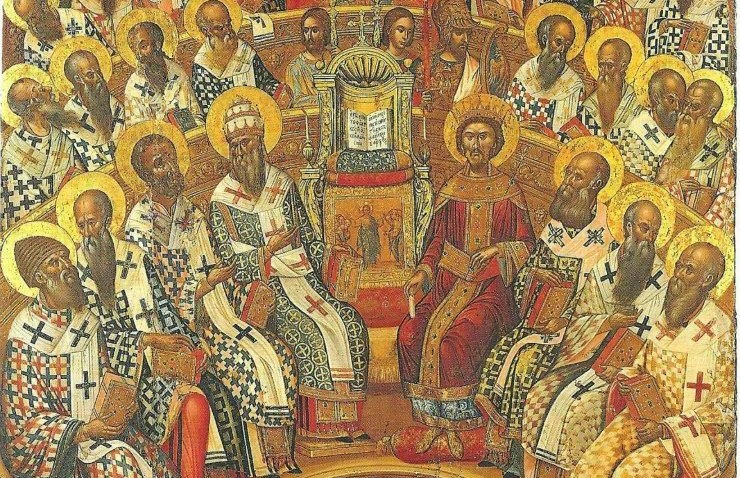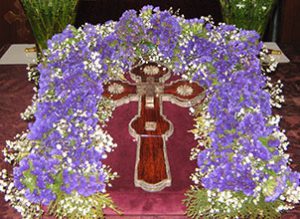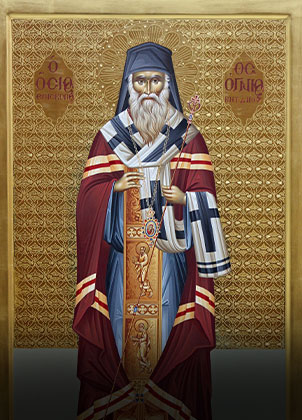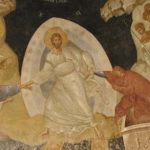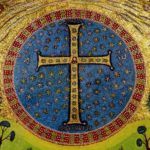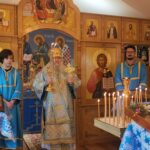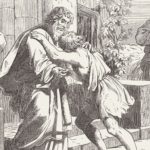Sunday of the Holy Fathers of the 1st Ecumenical Council
In the name of the Father and of the Son and of the Holy Spirit.
As the Gospel recounts, the Lord Jesus Christ once asked His disciples: “Who do you say that I, the Son of Man, am?” Peter answered for all others: “You are the Christ, the Son of the living God.” The Lord praised Peter for his confession and said: “On this rock (i.e., on this confession) I will build My Church, and the gates of hell shall not prevail against it” (Math. 16). Thus, the teaching that Jesus Christ is the Son of God is the foundation of the Church, the main dogma of Christianity.
The gates of hell have been at war against the Church from the first days of its existence. First of all, the devil has incited hatred and persecution against Christians. But even more dangerous for the Church were different heresies, i.e., false teachings. As weeds among wheat the first heresies started to appear in the early Church that was planted by the apostles. The epistles of St Paul, Peter, John, and Judas speak about the false teachings which were spreading among the first Christians.
Today’s reading from the Acts of the Apostles conveys to us the parting words of St Paul to the priests of Ephesus: “Take heed to yourselves and to all the flock, among which the Holy Spirit has made you overseers, to shepherd the church of God which He purchased with His own blood. For I know this, that after my departure savage wolves will come in among you, not sparing the flock. Also from among yourselves men will rise up, speaking perverse things, to draw away the disciples after themselves.” (Acts 20)
St Paul denotes here the main motive of false teachers: ‘to draw away the disciples after themselves’. Pride and vainglory urged heretics to introduce the new teachings, unknown to the Church. But the inventor of heresies is the devil, the inventor of all lies.
Today we celebrate the memory of the Holy Fathers of the 1st Ecumenical Council, which was convened in 325 in Nicaea by the emperor Constantine the Great. The main cause of the council was the heresy of Arius. He was a presbyter in Alexandria, eloquent and well-educated. Arius taught that Jesus Christ, though called the Son of God in the Scriptures, is not equal to God; that He is God’s creation, and there was time when He did not yet exist.
This way the Arian heresy attacked the very foundation of the Church.
No other heresy neither before nor after Arianism had such an impact on the Church. It had spread all over the Roman Empire and reached even beyond its borders. The Arian heresy disturbed the Church for many decades. At a certain point it seemed that it had prevailed, because the emperor and the bishops of the most important sees were Arians. Truly the gates of hell did open against the Church but were unable to overpower it.
The Nicaean Ecumenical council was gathered when persecutions against Christians had just ended. Among the Fathers of the council there were many confessors, who had endured torments for Christ’s sake. Among them were wonderworkers as St Nicholas and St Spyridon, and great theologians as St Athanasius of Alexandria. The number of bishops who arrived from all over the Roman Empire was 318.
The Fathers of the Council denounced the teaching of Arius as heretical and proclaimed that our Lord Jesus Christ in His Divine nature is Son of God, the only-begotten, born of the Father before all ages. Light of light, true God of true God, begotten, not made, of one essence with the Father, through Whom all things were made.
This teaching the Fathers imprinted in the Creed, which was left for the future generations as the model of the Orthodox faith.
However, the 1st Ecumenical council didn’t put an end to the Arian heresy. It continued to disturb the Church for about 60 years thereafter, until it was finally defeated through the efforts of such great hierarchs as St Basil the Great, St Gregory the Theologian and others, who lived later.
Heresies substitute the divinely-revealed truth with falsehood, here lies the cause of their destructive action on the soul. A heresy leads man away from God, from the realm of divine light and truth, into falsehood, the domain of the devil, the author of lies. Even though every heresy teaches about Christ, this teaching is but counterfeit since their concept is different. The Arians did worshipped Christ, however not as God but as creation, therefore, their worship turned into blasphemy.
This is what St Paul writes to Corinthians: “But I fear, lest somehow, as the serpent deceived Eve by his craftiness, so your minds may be corrupted from the simplicity that is in Christ. For if he who comes preaches another Jesus whom we have not preached, or if you receive a different spirit which you have not received, or a different gospel which you have not accepted — you might well bear with it!” (2 Cor. 11).
In the epistle to Galatians he speaks even stronger: “I marvel that you are turning away so soon from Him who called you in the grace of Christ, to a different gospel, which is not another; but there are some who trouble you and want to pervert the gospel of Christ. But even if we, or an angel from heaven, preach any other gospel to you than what we have preached to you, let him be accursed.” (Gal. 1)
Every heresy preaches “another” gospel and “another” christ, which they offer in place of the true Christ. This is why St John the Evangelist names the false teachers “antichrists”, since “antichrist” means in Greek “in place of Christ”. He says: “Little children, it is the last hour; and as you have heard that the Antichrist is coming, even now many antichrists have come. They went out from us, but they were not of us…”- and then he says-…. “Who is a liar but he who denies that Jesus is the Christ? He is antichrist who denies the Father and the Son.” (1 John 2)
In today’s Gospel the Lord says in His prayer to God the Father: “And this is eternal life: That they may know Thee, the only true God, and Jesus Christ, Whom Thou has sent.” (John.17)
To receive the eternal life we need to have the right knowledge of God and the Son of God Jesus Christ, as well as all His teaching and commandments. This true, saving knowledge of God is treasured only in the Orthodox Church. Outside of Her there is nothing but chaos of fallacies. Our salvation in eternity and happiness in this life depends on being in communion with God through the Church. As a bird cannot fly having but one wing, likewise we need both the Orthodox faith and life according to God’s commandments in order to be saved.
Amen.

